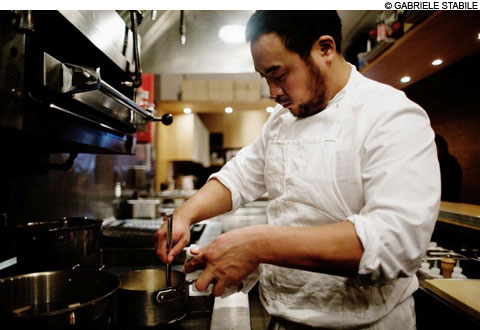
SPOILER ALERT Chef David Chang will speak at Harvard about how controlled spoilage makes food tasty, as part of a lecture series devoted to the science behind such gastonomic marvels as Wylie Dufresne's poached egg (see below). |
Chef David Chang isn't just busy — he's really freakin' busy. Currently, he's busting ass in Sydney, Australia, 10,000 miles away from his home base in New York, putting the finishing touches on the newest addition to the Momofuku restaurant family, Seiobo. The second issue of his McSweeney's-published food quarterly, Lucky Peach, hits newsstands this week. And in a few days, the 34-year-old rock-star chef is boarding a plane to Boston, because he's got a date with a science class that wants to hear him talk about the chemistry of rotting meat.This week, Chang is coming to Harvard to take part in "Science and Cooking: From Haute Cuisine to the Science of Soft Matter," a new lecture series devoted to the science of food that pairs renowned chefs with Harvard scientists.It all started two years ago, when Harvard post-doc Otger Campas and professor David Weitz decided to recruit chef Ferran Adrià — the founder of legendary food lab El Bulli and the patron saint of the culinary mad science that is molecular gastronomy — to collaborate on a course with the applied-physics department.
"I think it's an advantage that I'm not a food person," Weitz says. "I teach the science part of it. It's a real collaboration, and that's where it works spectacularly well."
The lectures were a smash hit, attracting over 700 undergraduates in their first run (400 more than the course could accommodate) and garnering international media attention from publications ranging from the New York Times to Physics World. Now open to the public, the lectures operate on a first-come, first-served basis (with the exception of Adrià's closing lecture in December, which is ticketed).On November 14, Chang takes the podium to talk about how bacteria and mold break down cells into enzymes and amino acids, and how that controlled spoilage can be used to make things taste good.
"It's a topic that we [his Momofuku kitchen team] sort of accidentally fell into by trying to make our own version of the Japanese katsuobushi [a type of dried, fermented, and smoked tuna]," Chang says via e-mail from Sydney. "We enlisted the help of Rachel Dutton and Ben Wolfe, two Harvard microbiologists who have been instrumental in unveiling the world of microbes in food, so I wanted to do a lecture that would just show how much the culinary world is controlled by microbes."
Chang insists microbiology is one of the most overlooked influences on flavor and creativity in the kitchen. "In the food industry, we know about how microbes work in dairy, wines, and cured meats — that's about all," he says. "But the flavor of foods is all about the interaction of the native microbes introduced."
Is he nervous? Hell, yes. "I want to do a good job," he says. "This is Harvard. The students in this class are brilliant, and I really admire the other presenters. It's a humbling experience. I don't know how anyone couldn't be nervous!"